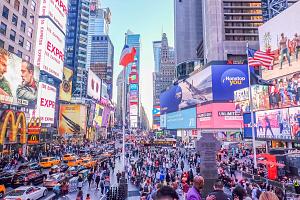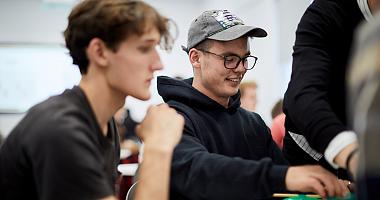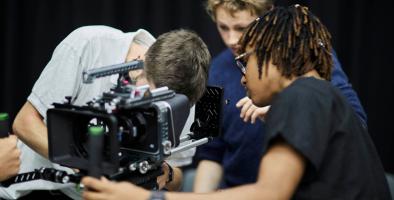BA (Hons)
Journalism
Content navigation menu
Why study BA Journalism at Goldsmiths
This programme offers an innovative blend of contemporary multimedia journalism that ensures you're prepared for the future of a rapidly developing news industry.
- You’ll learn a range of cutting-edge digital skills to help you investigate news stories.
- You’ll also learn how and why good journalism matters by putting it in its wider cultural context.
- Learn from media professionals with extensive industry experience and leading academics involved in ground-breaking research.
- Work on a real-world news website (EastLondonLines), covering breaking news stories that really matter to the local community.
- Develop an arsenal of digital skills, and learn to integrate them with a core of essential reporting and news-writing skills. Digital skills taught on this programme include: video journalism; data journalism; mobile journalism and web programming.
- Get training with a range of digital video equipment to support your practice, including DSLRs, and ENG (electronic news gathering) cameras.
- Produce a long-form news feature on a subject of your choice, which will allow you to bring together all the digital and news-writing skills learned over the course of this degree. Examples of previous projects can be found below.
- Build up a portfolio of work, get advice on careers and work experience, and benefit from our close links with London’s thriving world-class media industry.
Contact the department
If you have specific questions about the degree, contact Omega Douglas.
UCAS code
P500
Entry requirements
A-level: BBB
BTEC: DDM
IB: 33 points overall with Three HL subjects at 655
Length
3 years full-time
Fees
Home - full-time: £9250
International - full-time: £20840
Department
Watch videos about your course
What you'll study
Year 1 (credit level 4)
All modules in your first year are compulsory:
| Module title | Credits |
|---|---|
| Introduction to Power, Politics and Public Affairs | 15 credits |
| Introduction to Multimedia Journalism | 30 credits |
| News and Culture | 15 credits |
| Key Debates in Media Studies | 15 credits |
| Introduction to coding and digital methods for journalism | 15 credits |
| Broadcast journalism 1: Audio and Video | 30 credits |
Note about optional modules (if available): The above is indicative of the typical modules offered, but is not intended to be construed or relied on as a definitive list of what might be available in any given year. The module content and availability is subject to change.
Teaching style
This programme is taught through scheduled learning – for example, through a mixture of lectures, seminars and workshops. You’ll also be expected to undertake a significant amount of independent study. This includes carrying out required and additional reading, preparing topics for discussion, and producing essays or project work.
How you'll be assessed
You’ll be assessed by a variety of methods, depending on your module choices. These may include coursework assignments such as extended essays, reports, presentations, practice-based projects or essays/logs, group projects and reflective essays, as well as seen and unseen written examinations.
Entry requirements
We accept the following qualifications:
A-level: BBB
BTEC: DDM
International Baccalaureate: 33 points overall with Three HL subjects at 655
UAL Extended Diploma: Merit overall
Access: Pass with 45 Level 3 credits including 30 Distinctions and a number of merits/passes in subject-specific modules
Scottish qualifications: BBBBC (Higher) or BBC (Advanced Higher)
European Baccalaureate: 75%
Irish Leaving Certificate: H2 H2 H2 H2
If you can't find your qualification here, then please visit our entry requirements page for a list of alternative qualifications.
Additional requirements
GCSE Maths at Grade C/4. If you are unsure whether you meet these requirements, please check our list of equivalent qualifications.
As the course demands significant amounts of writing, it's important that you are able to cope with the rigours of the course. You may be asked for examples of written work and called to interview.
Alternative qualifications and experience
See our full list of undergraduate entry qualifications.
We welcome students with a range of educational experiences. If you believe you may not meet the standard qualification requirements we would still encourage you to apply because we consider all aspects of your application when making a decision.
We’ll pay particularly careful attention to your personal statement, which is your opportunity to demonstrate your interest in the subject you’ve applied for. Your referees are also welcome to include any relevant contextual comments around your academic achievements. We’ll look at all these things when making a decision on your application, as well as your qualifications and grades, and may still be able to offer you a place.
International qualifications
We also accept a wide range of international qualifications. Find out more about the qualifications we accept from around the world.
If English isn’t your first language, you will need an IELTS score (or equivalent English language qualification) of 7.0 with a 7.0 in writing and no element lower than 6.5 to study this programme. If you need assistance with your English language, we offer a range of courses that can help prepare you for degree-level study.
Fees and funding
Annual tuition fees
These are the UG fees for students starting their programme in the 2024/2025 academic year.
- Home - full-time: £9250
- International - full-time: £20840
If your fees are not listed here, please check our undergraduate fees guidance or contact the Fees Office, who can also advise you about how to pay your fees.
It’s not currently possible for international students to study part-time if you require a Student Visa, however this is currently being reviewed and will be confirmed in the new year. Please read our visa guidance in the interim for more information. If you think you might be eligible to study part-time while being on another visa type, please contact our Admissions Team for more information.
If you are looking to pay your fees please see our guide to making a payment.
Funding opportunities
The Royal Television Society runs two bursary schemes: the Technology Bursary and the TV Production and Journalism Bursary. The schemes are designed to support people from lower-income backgrounds to pursue a career in the television industry.
RTS bursary recipients benefit from:
- financial support
- free RTS membership
- networking events
This prestigious award also offers a real opportunity to gain insight into the industry and build a network of key contacts. As a bursary recipient you receive £1000 per year of study, membership of the Royal Television Society and affiliate membership of the Club while studying, one year's free membership of the Royal Television Society when you graduate and in the second or third year of your course we will aim to set up a mentoring opportunity with one of our many industry mentors.
If you are interested in current affairs journalism or documentary production, your application can be considered for one of two Steve Hewlett awards, worth an extra £1000 per year.
For more details, visit the RTS website.
We offer a wide range of scholarships and bursaries, and our careers service can also offer advice on finding work during your studies. Find out more about funding your studies with us.
Additional costs
In addition to your tuition fees, you'll be responsible for any additional costs associated with your course, such as buying stationery and paying for photocopying. You can find out more about what you need to budget for on our study costs page.
There may also be specific additional costs associated with your programme. This can include things like paying for field trips or specialist materials for your assignments. Please check the programme specification for more information.
Journalism work
Students on BA Journalism produce a range of journalistic work from long-form investigative articles to podcasts. You will also have the opportunity to contribute to EastLondonLines, an independent news website run by the School of Journalism in the Department of Media, Communications and Cultural Studies. The site runs throughout the year and students on all journalism programmes spend time working on the site. gaining valuable experience and building up their CVs. You work under the supervision of academic and technical staff.
To read some written journalism examples and to find out more about our students' work you can explore our dedicated student work page.
Careers
What kind of careers might you seek as a BA Journalism graduate?
- As a specialist journalist, using data visualisation and mapping to tell stories about key issues like crime, politics or the environment
- As a reporter, live blogging a football match for a sports website or a catwalk for a fashion magazine
- As a website reporter or editor, assembling multi-media stories or ‘live’ reporting, and using social media to interact with readers and viewers
But such is the pace of change you might be pursuing careers and using digital methods we cannot yet imagine… You can read more about possible career options after you graduate on our careers page.
Find out more about employability at Goldsmiths.
Skills
Some of the skills you'll develop during a journalism degree include:
- A range of journalistic skills - from news researching, writing and editing to data visualisation and video reporting
- Critical thinking and analytical skills
- Proficiency in assessing evidence and in expressing ideas clearly
- An ability to bring together insights from a range of subjects
- Computing skills, in web programming and creating digital projects
- Communications skills applicable across a wide range of media-related careers




